仁爱科普版七年级下册Unit 5 Our school life Topic 1 Section C课件(共24张PPT,内嵌音频)
文档属性
| 名称 | 仁爱科普版七年级下册Unit 5 Our school life Topic 1 Section C课件(共24张PPT,内嵌音频) |  | |
| 格式 | pptx | ||
| 文件大小 | 19.9MB | ||
| 资源类型 | 教案 | ||
| 版本资源 | 仁爱科普版 | ||
| 科目 | 英语 | ||
| 更新时间 | 2023-07-03 08:52:42 | ||
图片预览

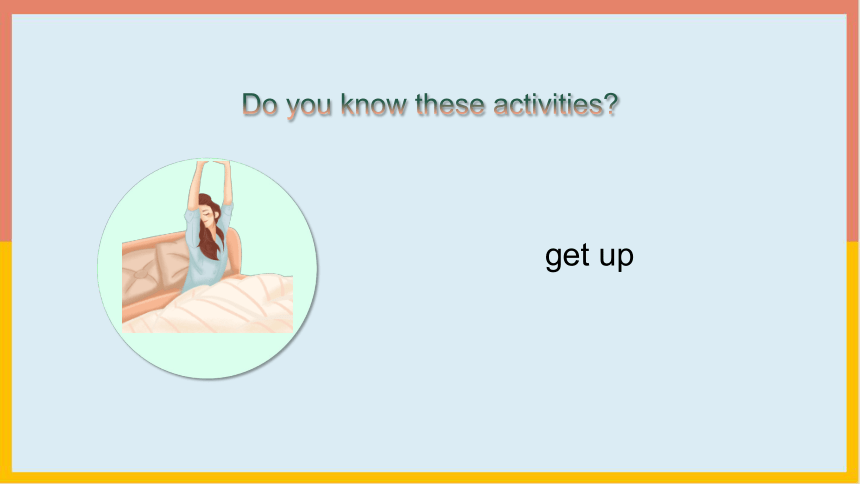

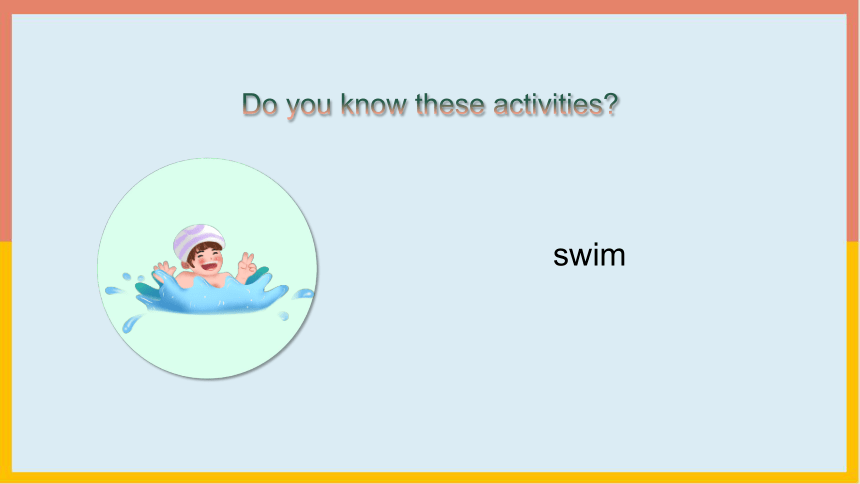
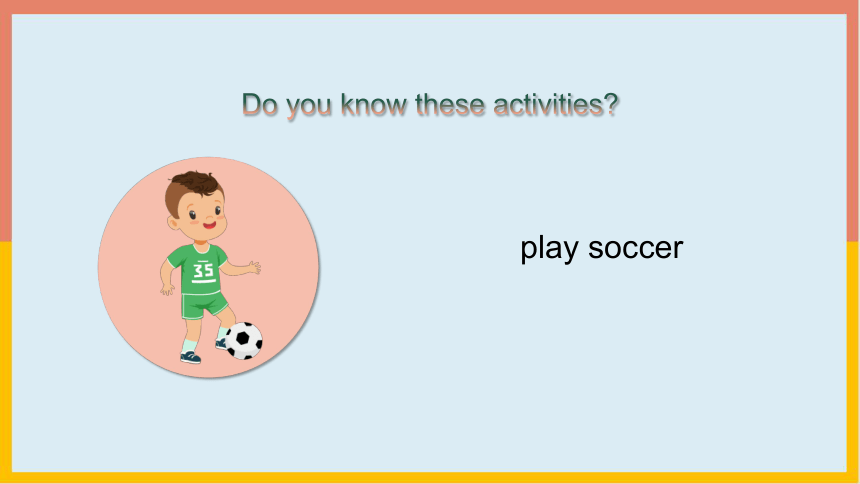
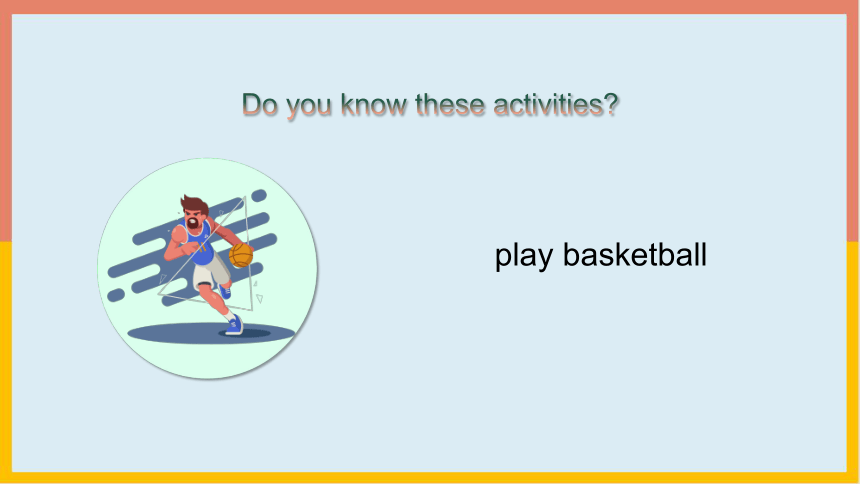
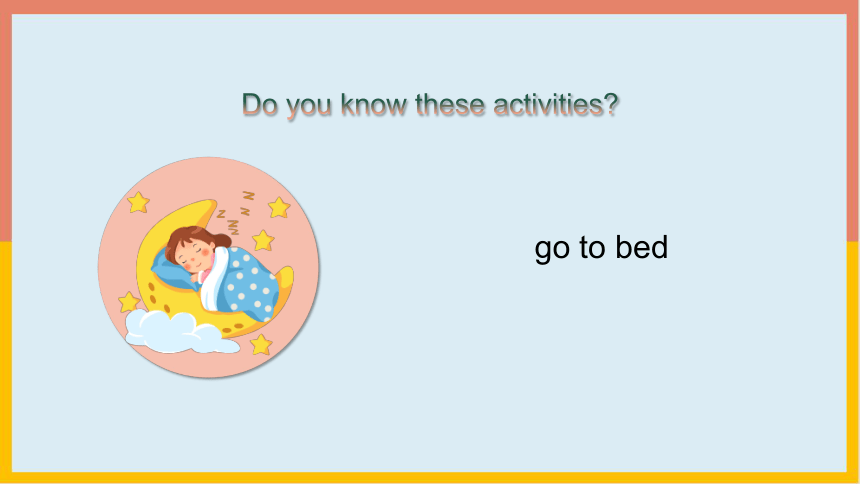
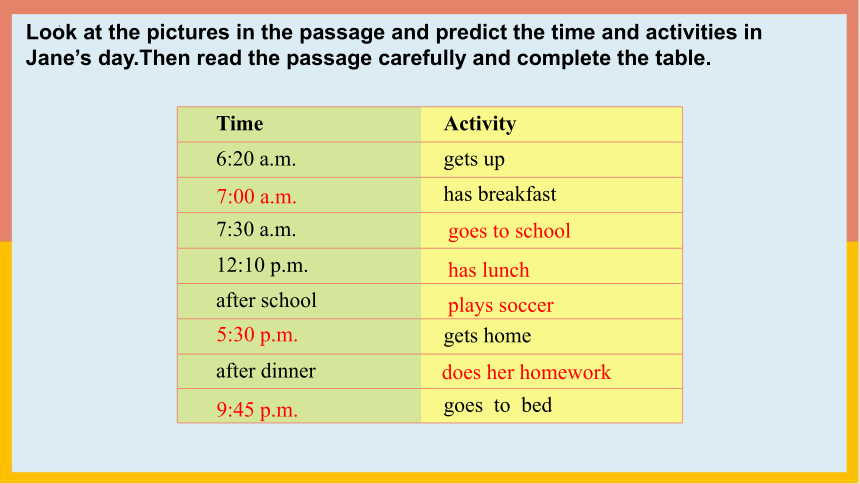
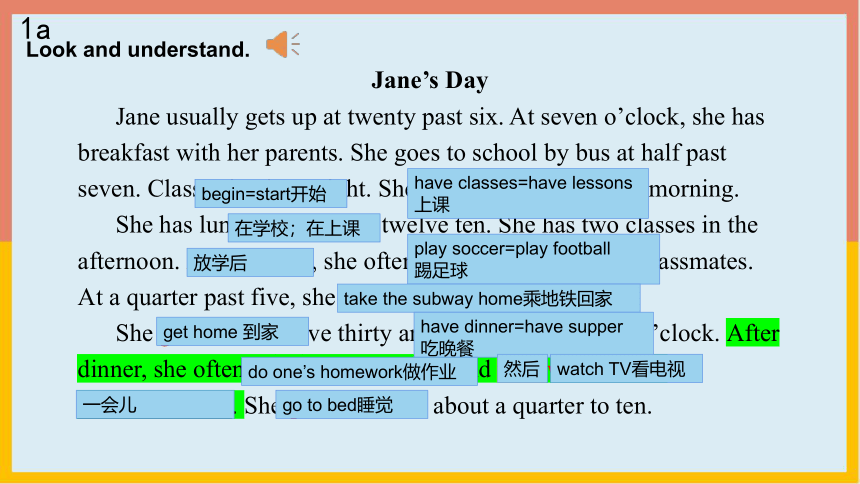
文档简介
(共24张PPT)
Unit 5 Our School Life
Topic 1 I usually come to school by subway.
Section C
Do you know these activities
get up
eat breakfast
Do you know these activities
Do you know these activities
swim
play soccer
Do you know these activities
Do you know these activities
play basketball
go to bed
Do you know these activities
Time Activity
6:20 a.m. gets up
has breakfast
7:30 a.m.
12:10 p.m.
after school
gets home
after dinner
goes to bed
7:00 a.m.
goes to school
has lunch
plays soccer
5:30 p.m.
does her homework
9:45 p.m.
Look at the pictures in the passage and predict the time and activities in Jane’s day.Then read the passage carefully and complete the table.
1a
Look and understand.
Jane’s Day
Jane usually gets up at twenty past six. At seven o’clock, she has breakfast with her parents. She goes to school by bus at half past seven. Classes begin at eight. She has four classes in the morning.
She has lunch at school at twelve ten. She has two classes in the afternoon. After school, she often plays soccer with her classmates. At a quarter past five, she takes the subway home.
She gets home at five thirty and has dinner at seven o’clock. After dinner, she often does her homework and then watches TV
for a short time. She goes to bed at about a quarter to ten.
begin=start开始
have classes=have lessons上课
在学校;在上课
放学后
play soccer=play football
踢足球
take the subway home乘地铁回家
get home 到家
have dinner=have supper
吃晚餐
do one’s homework做作业
然后
watch TV看电视
一会儿
go to bed睡觉
Language points 知识点
1.At seven o’clock, she has breakfast with her parents.七点钟,她和父母共进早餐。
(1)have breakfast/lunch/supper意为“吃早/午/晚餐”,三餐前不加冠词,但当三餐前有形容词修饰时,要加冠词。
e.g.
have a big supper吃一顿丰盛的晚餐
(2)with sb.意为“和某人一起”。当with意为“和”时要注意与and区别:
and是并列连词;with是介词,介词+宾格。A with B,是附属的。
e.g.
--Would you like to play Ping Pong with us?你愿意和我们一起打乒乓球吗?
--Yes,I’d like to.是的,我愿意。
Language points 知识点
2.Classes begin at eight. She has four classes in the morning.八点开始上课,她上午上四节课。
(1)begin to do sth.=begin doing sth.开始做某事
e.g.
Steve usually begins to work at 7:30 a.m. every day.通常史蒂夫每天早上七点半开始工作
(2)have classes/have a class上课
e.g.
We have an English class at 8:00 a.m. on Monday.我们周一早上八点上英语课。
Language points 知识点
3.After dinner, she often does her homework and then watches TV 晚饭后 ,她经常做作业,然后看一会儿电视
for a short time一会儿
介词for用于一段时间之前,表示时间长度
e.g.
Sam wants to play for one day.山姆想玩一天。
Language points 知识点
”看“的区别
(1)look(看)强调看的动作,其后接宾语要加介词at。
e.g.
Look at that boy.He is in the tree.看那个男孩,他在树上。
(2)see(看见)强调看的结果。
e.g.
I can see many animals in the zoo.我在动物园能看到很多动物。
Language points 知识点
”看“的区别
(3)watch(观看;注视)强调聚精会神地看或欣赏。
e.g.
I often watch TV in the evening.我经常晚上看电视。
(4)read(看书)
e.g.
He is reading books now.他正在看书。
Han Qing
play soccer
play basketball
What does Han Qing usually do after school
He usually plays soccer, but he doesn’t play basketball.
2
Ask and answer questions with the following information.
Wen Wei
go swimming
go fishing
What does Wen Wei usually do after school
He usually goes swimming, but he doesn’t go fishing.
Ask and answer questions with the following information.
2
Ellen
listen to music
watch TV
What does Ellen usually do after school
She usually listens to music, but she doesn’t watch TV.
Ask and answer questions with the following information.
2
Wang Junfeng
do his homework
go to the park
What does Wang Junfeng usually do after school
He usually does his homework, but he doesn’t
go to the park.
Ask and answer questions with the following information.
2
Example:
A: Do you often read books in the library
B: Yes, I do. /No, I don’t.
A: How often do you come to the library
B: Three times a week.
Activity Frequency
meet friends watch TV listen to music read books cook go to the zoo play soccer once a week twice a week three times a week
very often
every day seldom
never
Work in pairs.Make up new conversations with the words and phrases in the box.
3
Do you often meet friends
No, I don’t.
3
Work in pairs.Make up new conversations with the words and phrases in the box.
Do you often go to the zoo
Yes, I do.
How often do you go to the zoo
Once a week.
3
Work in pairs.Make up new conversations with the words and phrases in the box.
Do you often play soccer
Yes, I do.
How often do you play soccer
Twice a week.
3
Work in pairs.Make up new conversations with the words and phrases in the box.
Language points 知识点
—How often do you come to the library 你多久来一次图书馆?
—Three times a week. 一周三次。
(1) how often意为“多久一次”,对动作发生的频率进行提问。
回答时常用到频度副词often、usually、sometimes、seldom、never及表示频度的短语once a week、twice a month等。
(2) three times意为“三次”。
一次用once,两次用twice,
三次或三次以上用“数词+times”表示。
Unit 5 Our School Life
Topic 1 I usually come to school by subway.
Section C
Do you know these activities
get up
eat breakfast
Do you know these activities
Do you know these activities
swim
play soccer
Do you know these activities
Do you know these activities
play basketball
go to bed
Do you know these activities
Time Activity
6:20 a.m. gets up
has breakfast
7:30 a.m.
12:10 p.m.
after school
gets home
after dinner
goes to bed
7:00 a.m.
goes to school
has lunch
plays soccer
5:30 p.m.
does her homework
9:45 p.m.
Look at the pictures in the passage and predict the time and activities in Jane’s day.Then read the passage carefully and complete the table.
1a
Look and understand.
Jane’s Day
Jane usually gets up at twenty past six. At seven o’clock, she has breakfast with her parents. She goes to school by bus at half past seven. Classes begin at eight. She has four classes in the morning.
She has lunch at school at twelve ten. She has two classes in the afternoon. After school, she often plays soccer with her classmates. At a quarter past five, she takes the subway home.
She gets home at five thirty and has dinner at seven o’clock. After dinner, she often does her homework and then watches TV
for a short time. She goes to bed at about a quarter to ten.
begin=start开始
have classes=have lessons上课
在学校;在上课
放学后
play soccer=play football
踢足球
take the subway home乘地铁回家
get home 到家
have dinner=have supper
吃晚餐
do one’s homework做作业
然后
watch TV看电视
一会儿
go to bed睡觉
Language points 知识点
1.At seven o’clock, she has breakfast with her parents.七点钟,她和父母共进早餐。
(1)have breakfast/lunch/supper意为“吃早/午/晚餐”,三餐前不加冠词,但当三餐前有形容词修饰时,要加冠词。
e.g.
have a big supper吃一顿丰盛的晚餐
(2)with sb.意为“和某人一起”。当with意为“和”时要注意与and区别:
and是并列连词;with是介词,介词+宾格。A with B,是附属的。
e.g.
--Would you like to play Ping Pong with us?你愿意和我们一起打乒乓球吗?
--Yes,I’d like to.是的,我愿意。
Language points 知识点
2.Classes begin at eight. She has four classes in the morning.八点开始上课,她上午上四节课。
(1)begin to do sth.=begin doing sth.开始做某事
e.g.
Steve usually begins to work at 7:30 a.m. every day.通常史蒂夫每天早上七点半开始工作
(2)have classes/have a class上课
e.g.
We have an English class at 8:00 a.m. on Monday.我们周一早上八点上英语课。
Language points 知识点
3.After dinner, she often does her homework and then watches TV 晚饭后 ,她经常做作业,然后看一会儿电视
for a short time一会儿
介词for用于一段时间之前,表示时间长度
e.g.
Sam wants to play for one day.山姆想玩一天。
Language points 知识点
”看“的区别
(1)look(看)强调看的动作,其后接宾语要加介词at。
e.g.
Look at that boy.He is in the tree.看那个男孩,他在树上。
(2)see(看见)强调看的结果。
e.g.
I can see many animals in the zoo.我在动物园能看到很多动物。
Language points 知识点
”看“的区别
(3)watch(观看;注视)强调聚精会神地看或欣赏。
e.g.
I often watch TV in the evening.我经常晚上看电视。
(4)read(看书)
e.g.
He is reading books now.他正在看书。
Han Qing
play soccer
play basketball
What does Han Qing usually do after school
He usually plays soccer, but he doesn’t play basketball.
2
Ask and answer questions with the following information.
Wen Wei
go swimming
go fishing
What does Wen Wei usually do after school
He usually goes swimming, but he doesn’t go fishing.
Ask and answer questions with the following information.
2
Ellen
listen to music
watch TV
What does Ellen usually do after school
She usually listens to music, but she doesn’t watch TV.
Ask and answer questions with the following information.
2
Wang Junfeng
do his homework
go to the park
What does Wang Junfeng usually do after school
He usually does his homework, but he doesn’t
go to the park.
Ask and answer questions with the following information.
2
Example:
A: Do you often read books in the library
B: Yes, I do. /No, I don’t.
A: How often do you come to the library
B: Three times a week.
Activity Frequency
meet friends watch TV listen to music read books cook go to the zoo play soccer once a week twice a week three times a week
very often
every day seldom
never
Work in pairs.Make up new conversations with the words and phrases in the box.
3
Do you often meet friends
No, I don’t.
3
Work in pairs.Make up new conversations with the words and phrases in the box.
Do you often go to the zoo
Yes, I do.
How often do you go to the zoo
Once a week.
3
Work in pairs.Make up new conversations with the words and phrases in the box.
Do you often play soccer
Yes, I do.
How often do you play soccer
Twice a week.
3
Work in pairs.Make up new conversations with the words and phrases in the box.
Language points 知识点
—How often do you come to the library 你多久来一次图书馆?
—Three times a week. 一周三次。
(1) how often意为“多久一次”,对动作发生的频率进行提问。
回答时常用到频度副词often、usually、sometimes、seldom、never及表示频度的短语once a week、twice a month等。
(2) three times意为“三次”。
一次用once,两次用twice,
三次或三次以上用“数词+times”表示。
同课章节目录
- Unit 5 Our school life
- Topic 1 I usually come to school by subway.
- Topic 2 A few students are running around the play
- Topic 3 My school life is very interesting.
- Unit 6 Our local area
- Topic 1 Is there a computer in your study?
- Topic 2 My home is in an apartment building.
- Topic 3 Which is the way to the hospital?
- Review of Units 5-6
- Unit 7 The Birthday
- Topic 1 When is your birthday?
- Topic 2 Can you sing an English song?
- Topic 3 Everyone had a good time.
- Unit 8 The seasons and the Weathe
- Topic 1 What's the weather like in summer?
- Topic 2 The summer holidays are coming.
- Topic 3 Let’s celebrate!
- Review of Units 7-8
- 旧版资料
- Unit 5 Our School Life
- Unit 6 Our Local Area
- Unit 7 The Birthday
- Unit 8 The seasons and the Weathe
- Unit 7 Celebrating the Birthday(老版本)
